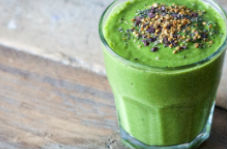5 Home Remedies For Healthy Blood Sugar Levels
 0
0
 2015-09-03
2015-09-03

Diabetes is a rapidly spreading health monster that is taking over the lives of many. With the increasing prevalence of diabetes in the country, it has become an alarming truth that cannot be ignored. Many specialists consider diabetes to be a lifestyle problem of the recent generations. Sedentary jobs, unhealthy eating habits and poor exercise routines can also affect sugar levels in the body leading to diabetes at a very early age.
When suffering from diabetes, particularly type 2, medications and insulin injections become a part of the staple diet. But who really likes to consume medicines every day? Instead there are a few home remedies that patients can try to combat rising blood sugar levels and lead a healthy and happy life even with diabetes.
- Tulsi
Tulsi, also known as Holy Basil, is rich in antioxidants and essential oils which affect the pancreatic cells in the body. Tulsi leaves exude compounds such as eugenol, caryophyllene etc which reach the pancreas and regulate the functioning of the cells to properly store and release insulin as per requirements of the body. The effects of the compounds make the body more sensitive to insulin ensuring that blood sugar levels are well within control. The antioxidants present in Tulsi also combat the negative effects of stress and help detoxify the body. To know more about how to incorporate Tulsi in your diet to fight diabetes, click here.
- Cinnamon
Commonly known as Dalchini, cinnamon is a spice that helps to lower blood sugar levels in the body and improve insulin sensitivity to help combat diabetes. Consuming measured quantities of cinnamon everyday controls body weight, reduces the risk of heart disease and improves balance of sugar levels in the blood. Adding half a spoonful of cinnamon to your daily diet will show drastic improvements in health. Whether you add it to a glass of water or consume it as a paste mixed with honey, your body will thank you for the multiple benefits of cinnamon. An alternative is to consume cinnamon supplements; to know more, click here.
- Flax Seeds
Flax seeds are known for their high protein and fibre content which are extremely essential for the body to regulate its functioning and maintain appropriate levels of insulin to keep high blood sugar at bay. Studies have shown that consuming flax seeds daily can reduce postprandial sugar levels by almost 28-30%. To incorporate flax seeds in your diet, grind the seeds to make a powder and consume one tablespoon each morning on an empty stomach along with a glass of warm water. Avoid ingesting more than 2 tablespoons a day as it can be harmful in excess quantities. Find out more about how you can consume flax seeds here.
- Green Tea
Green tea should be consumed on a daily basis irrespective of sugar levels to maintain good health and internal balance of the body. But its high polyphenol composition makes it particularly beneficial for people suffering from diabetes. It’s strong antioxidant and hypoglycaemic compounds control the release of sugar in the blood stream and optimise the insulin content in the body. Drinking a glass a green tea at least twice a day is a recommended habit to follow to ensure effective functioning of internal systems. To get more information about green tea, click here.
- Moringa
Moringa, a naturally growing plant, is known for its bioactive plant compounds and is an excellent source of essential vitamins and minerals. Moringa is available for consumption as a dietary supplement in the form of powder or capsules. Consuming Moringa helps to instantly uplift one’s energy and increase satiety and create a feeling of fullness. This helps to slow the breakdown of food in the digestive system and lowers blood pressure. Moringa is highly recommended by many naturopaths and Ayurvedic doctors to control diabetes in patients. Not sure of how and where to get Moringa? Click here.
While patients may not be able to give up medications completely, following these home remedies may help to decrease the dependency. With just a few modifications to the lifestyle and a couple of changes in the diet, patients can effectively manage the disease and lead a full and satisfying life.

 Joybynature.com Team
Joybynature.com Team



